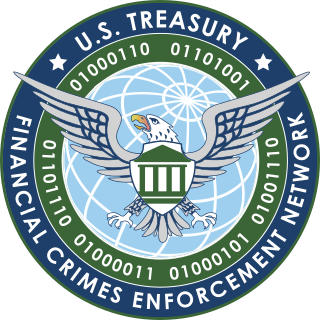 W
WThe Central Economic Intelligence Bureau (CEIB) is an Indian intelligence agency responsible for gathering information and monitoring the economic and financial sectors for economic offences and warfare.
 W
WThe Directorate of Enforcement (ED) is a law enforcement agency and economic intelligence agency responsible for enforcing economic laws and fighting economic crime in India. It is part of the Department of Revenue, Ministry of Finance, Government Of India. It is composed of officers from the Indian Revenue Service, Indian Police Service and the Indian Administrative Service as well as promoted officers from its own cadre. The total strength of the department is less than 2000 officers out of which around 70% of officials came from deputation from other organizations while ED has its own cadre, too.
 W
WThe Directorate of Revenue Intelligence (DRI) is an Indian intelligence agency. It is India's apex anti-smuggling intelligence, investigations and operations agency.
 W
WThe European Anti-Fraud Office is a body mandated by the European Union (EU) with protecting the Union's financial interests. It was founded on 28 April 1999, under the European Commission Decision 1999/352. Its tasks are threefold:to fight fraud affecting the EU budget; investigate corruption by staff of EU institutions; and develop anti-fraud legislation and policies.
 W
WThe Financial Crimes Enforcement Network (FinCEN) is a bureau of the United States Department of the Treasury that collects and analyzes information about financial transactions in order to combat domestic and international money laundering, terrorist financing, and other financial crimes.
 W
WThe Financial Guard was the control agency, subordinated to the National Agency for Fiscal Administration (ANAF), having a mandate to control the financial, economic and customs domains to prevent and sanction the tax evasion and tax-related fraud according to the legislation in effect. The institution was headed by a civil servant, having the mandate of the Chief Commissioner, being appointed by the Minister of Public Finance.
 W
WForensic Data Analysis (FDA) is a branch of Digital forensics. It examines structured data with regard to incidents of financial crime. The aim is to discover and analyse patterns of fraudulent activities. Data from application systems or from their underlying databases is referred to as structured data.
 W
WThe Guardia di Finanza is an Italian law enforcement agency under the authority of the Minister of Economy and Finance. It is a militarized police force, forming a part of the Ministry of Economy and Finance, not the Ministry of Defence. Guardia di Finanza is essentially responsible for dealing with financial crime and smuggling; it has also evolved into Italy's primary agency for suppressing the illegal drug trade. It maintains over 600 boats and ships and more than 100 aircraft to serve in its mission of patrolling Italy's territorial waters.
 W
WMoneyval is the common and official name of the Committee of Experts on the Evaluation of Anti-Money Laundering Measures and the Financing of Terrorism. Moneyval is a monitoring body of the Council of Europe, with 47 member states, reporting directly to its principal organ, the Committee of Ministers of the Council of Europe.
 W
WThe Office of Terrorist Finance and Financial Crimes (TFFC) is an agency of the United States federal government in the United States Department of the Treasury. Under the supervision of the Under Secretary for Terrorism and Financial Intelligence, the TFFC is policy development and outreach office for the Under Secretary and works across all elements of the national security community – including the law enforcement, regulatory, policy, diplomatic and intelligence communities – and with the private sector and foreign governments to identify and address the threats presented by all forms of illicit finance to the international financial system.
 W
WThe Regional Economic Intelligence Committee is the apex forum overseeing government agencies responsible for economic intelligence and combating economic offenses in the respective states of India. The Committee is under the Economic Intelligence Council. It was formed in 1990. The head of the committee is usually the Director General of the Directorate General of Income Tax Investigation.
 W
WThe Federal Financial Monitoring Service of the Russian Federation is a Federal Service that was created by a decree of President Vladimir Putin of November 1, 2001, and aimed to collect and analyze information about financial transactions in order to combat domestic and international money laundering, terrorist financing, and other financial crimes. The organization also provides lists of people accused of terrorist or "extremist" activities and books.
 W
WThe Customs Surveillance Service is a law enforcement agency of the Spanish Ministry of Finance, integrated in the Spanish Tax Agency. Its responsibilities include the investigation and prosecution of cases involving contraband, illegal drugs, financial evasion and violations, money laundering, surveillance for financial police purposes and the provision of judicial police services. Its activities can be compared in USA with agencies like the Drug Enforcement Administration, ATF, or some of the U.S. Customs and Border Protection
 W
WThe U.S. Securities and Exchange Commission (SEC) is a large independent agency of the United States federal government, created in the aftermath of the Wall Street Crash of 1929. The primary purpose of the SEC is to enforce the law against market manipulation.
 W
WThe Under Secretary for Terrorism and Financial Intelligence is a position within the United States Department of the Treasury responsible for directing the Treasury's efforts to cut the lines of financial support for terrorists, fight financial crime, enforce economic sanctions against rogue nations, and combat the financial support of the proliferation of weapons of mass destruction. The Under Secretary is appointed by the President and confirmed by the Senate.